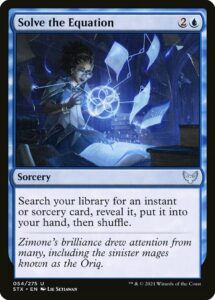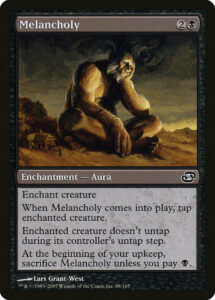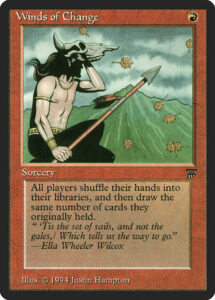The economy of Magic: the Gathering Arena has become a hot topic of late. People have understandably had many reactions to Wizards’ recent comments. I sympathize with Wizards of the Coast: it’s hard getting an economy right, especially that of a client like Arena whose incredible success seems to have taken then by surprise (not to mention the massive strain placed upon it due to the pandemic). But Arena’s economy has problems. When players feel that too much money and time is demanded of them, they get upset and stop spending both inside and outside the game.
The mounting pressure leading up to Wizards starting this discussion (and then frustration when more drastic changes weren’t announced) has engendered complaints and suggestions for how Wizards could fix its problems. Today, I’d like to address this discourse. Not to say that people aren’t entitled to being exasperated or have good ideas—they absolutely are—but to talk about how one can best communicate with game designers.
Design Constraints
Game designers are problem solvers. We love solving problems and are in the business of solving hard problems. Some of our work is likely obvious to most people: tasks like creating engaging mechanics, fun components, and balanced strategies. But we also have to balance schedules (our own, our other in-house teams, and our external partners). We have to consider the costs of adding additional components (both the physical costs they add to manufacturing and distribution as well as the time they add to the aforementioned schedules). We have to identify who our player bases are and ensure that we’re serving all of them, not just the ones who most resemble us.
We are beholden to our clients, be they companies that need to make a profit to remain in business or institutions that want products which provide a specific artistic or educational value. Much of game design involves trial and error, where you produce a series of failed prototypes—they’re invaluable instructors in the process, but they add uncertainty to planning at every stage.
All of that’s to say, game design involves tradeoffs. You have a finite amount of time and resources. You have multiple audiences and stakeholders who invariably have some contradictory desires. And that’s why it can be less helpful when someone says, “well why don’t you just do [idea]? It’d solve so many problems!”
Now, to be clear, game designers need to know what their audiences want. We crave feedback. We can be horrendous at perceiving issues in advance, missing out on entire styles of play because we playtest as we intend the game to be played, not how its incentives actually encourage people to play. But the most helpful feedback for us tends to be how players react to something rather than how they would change it.
I can’t count how many times I was told something would make a game better when it had already been tested and found to cause awful problems, encouraged to do a “quick fix” which would actually require rebuilding a game’s code from scratch, or change a major feature to satisfy a player type who the feature explicitly wasn’t designed for. It’s so much more helpful to witness a player’s reaction, to see them being frustrated, to listen to them being enthralled, or be told about how disappointed they were by a reward. I probably can’t implement their proposed solution, but I can absolutely add their perspective to my information and design constraints while searching for a better solution.
Again, to be clear: players are absolutely right to criticize, complain, and propose their own solutions. Sometimes, it’s very helpful feedback. But much of the time, designers have to translate this information, guessing at the underlying experiences. At best, this leads to muddier data. Oftentimes, the feedback is just discarded. That’s why I always encourage people to focus primarily on how they’re feeling, secondarily on why they feel that way (data that while helpful, is more prone to error), and relatively little on what changes they think would help.
So, How do I feel about Arena’s Economy?
I am a beneficiary of Arena’s economy. As I see it, Arena seems meant for players who mix Constructed and Limited. Limited is generative, providing a card collection and wildcards to play with, while Constructed is consumptive, spending wildcards and leveraging that card collection. Constructed-focused players struggle to have enough resources to work with, since every deck they build spends precious resources.
As a Limited player who wins more than he loses, the economy is generous to me. I bought 20,000 gems when Guilds of Ravnica came out and without spending any more have nearly 50,000 today. This isn’t a humblebrag, nor is it intended to diminish real problems with Arena’s economy—it’s an example of how different people have different experiences and a specific area where Arena’s economy may not be as predatory as it is made out to be. Yes, it’s indicative of how Arena’s economy breaks when play isn’t balanced between Limited and Constructed, but Arena should cater to both play styles and not only reward Limited players.
My biggest problem with Arena right now isn’t its economy or the state of any of its Constructed formats, it’s boredom. I’ve previously discussed how the pandemic compressed the Magic I play from a span of months to a few weeks. I gorge myself on new sets and am done within two to three weeks. However, I’ve found that spreading out my play doesn’t fix the problem. I prefer Best of 3 Draft and have found that once a format is a month old, a sizable percentage of my opponents seem inexperienced, fielding decks of 45, 50, or even 60 cards in draft. Those matches probably aren’t fun for them, and they definitely aren’t fun for me (despite them giving me more wins).
I wish I could play Ranked Best of 3 (either of the current set or a throwback set) to avoid these matchups and have more challenging games, but Arena already splits its player bases between Quick Draft, Traditional Draft, and Premier Draft. There likely isn’t room for yet another slightly different queue, nor would it be justifiable to switch Premier Draft to Best of Three. All that’s to say, the how I’m feeling and why are probably helpful data to Magic Arena, while the obvious what which would fix my problem isn’t feasible.
Hopefully, my perspective can help you better articulate what you want and how you’re feeling. That isn’t to say you shouldn’t offer suggestions (I’ve done so plenty of times), but you should be aware that some types of feedback can be more fruitful. In general, it’s easier to be empathetic when listening to someone else’s experiences than when it feels like they are making demands of you. Now, of course, Wizards has to keep its players happy and its designers are very much engaged in solving the multifaceted and sometimes-contradictory problems required to do so. When we make their jobs a little bit easier by giving them clearer, more actionable data, we all win.
Zachary Barash is a New York City-based game designer and the last commissioner of Team Draft League. He designs for Kingdom Death: Monster, has a Game Design MFA from the NYU Game Center, and does freelance game design. When the stars align, he streams Magic (but the stars align way less often than he’d like).




